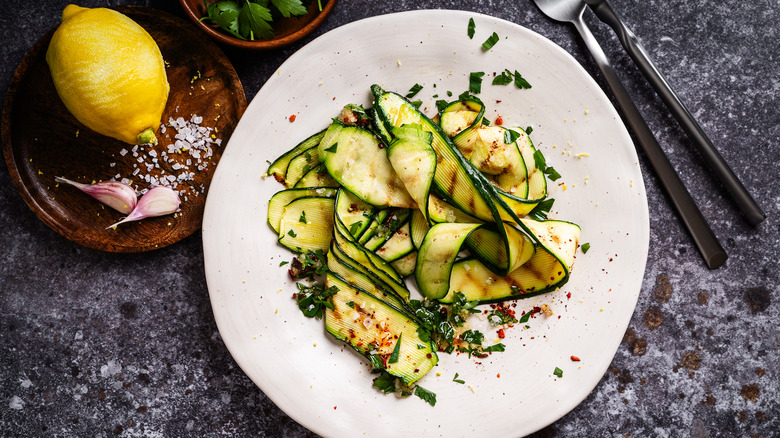This Popular Summer Vegetable Has More Potassium Than A Banana (And Can Help Lower High Blood Pressure)
Potassium is one of those important minerals that many people fall short of in their everyday diets. Potassium helps your muscles contract and keeps your fluid levels balanced. You might already know that sodium and potassium work together to regulate the fluids in your body, and it shouldn't be a surprise that most people get too much sodium in relation to potassium. It's recommended to keep sodium below 2,300 milligrams while aiming for 4,700 milligrams of potassium. If you do the math, that's about twice the potassium to sodium.
Before you reach for a potassium supplement or overstuff your body with bananas, plenty of foods are rich in potassium, such as zucchini. A cup of cooked zucchini gives you 475 milligrams of potassium, which is about 50 milligrams more potassium than a medium banana.
You might also be surprised that cooked zucchini is 95% water, which is higher than that of summer watermelon and peaches. That means zucchini might be one of your best foods to not only keep you hydrated but also manage your blood pressure.
Potassium-rich foods like zucchini reduce blood pressure
People with high blood pressure are often told to put down the salt shaker. The American Heart Association suggests that people with high blood pressure limit their daily sodium to 1,500 milligrams. Sodium causes you to store more fluid outside your cells, which puts pressure on your blood vessels. Potassium helps to remove excess sodium from your body so you don't retain as much water. That eases the pressure on your blood vessels.
Low-sodium and high-potassium diets like the Dietary Approaches to Stop Hypertension (DASH) diet are often recommended to lower blood pressure. According to a 2024 article in Clinical Hypertension, the high-potassium DASH diet can reduce blood pressure by 11 millimeters of mercury in people who have high blood pressure, and blood pressure can be reduced even more if people also restrict their sodium.
The article suggested that the ratio of sodium to potassium might be more important in lowering your blood pressure. Provided you don't cook your zucchini in salt water, there's only 5.4 milligrams of sodium in zucchini. That's a healthy 1 to 88 ratio. A similar serving of McDonald's french fries has a 1 to 3 ratio. (Potatoes also have more potassium than a banana, by the way.)
Other healthy nutrients in zucchini
Zucchini has other health benefits besides reducing your blood pressure and keeping you hydrated. Cooked zucchini gives you 25% of your daily recommended amount of vitamin C to help your body fight free radicals and reduce inflammation. Cooked zucchini also has 10% of your vitamin A in the form of beta carotene, which is another antioxidant that also keeps your eyes healthy. (Raw zucchini doesn't have as much vitamin A as cooked.) Speaking of healthy eyes, you'll find a healthy dose of lutein and zeaxanthin to protect your eyes from too much UV and blue light. Zucchini also has plenty of B vitamins such as folate, riboflavin, and B6.
Whether you choose yellow or green zucchini, a 2022 article in Applied Nanoscience found that both are good choices to help your body fight bacteria such as E. coli and certain types of fungi. Yellow zucchini might be able to battle leukemia cells, and the skin of green zucchini has the potential to combat cancer by preventing tumors from growing, according to a 2017 article in Nutrients.


